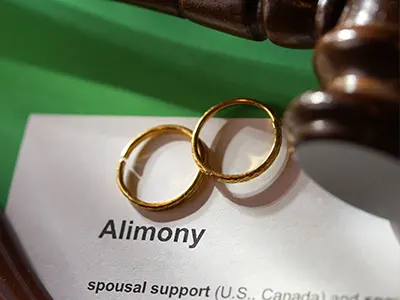 When it comes to spousal support or alimony, three things are in consideration: whether alimony should be awarded in the first place, and if so, how much and for how long. If you are seeking alimony, or are responding to an alimony request, having a lawyer is important in protecting your rights and interests.
When it comes to spousal support or alimony, three things are in consideration: whether alimony should be awarded in the first place, and if so, how much and for how long. If you are seeking alimony, or are responding to an alimony request, having a lawyer is important in protecting your rights and interests.
Reach out to an attorney at Goldman Law, LLC. Our alimony lawyers have been named Clients’ Choice for divorce cases, having helped numerous individuals get favorable outcomes from their marital legal issues. When you work with Goldman Law, we will:
- Use a forensic approach to identify income and needs
- Tap into our network of experts to establish financial status and optimize the outcome for you
- Craft alimony agreements that maximize after-tax cash
- Competently assert what you’re entitled to, even in complicated marital situations
- Negotiate a favorable resolution to the case.
Talk to Goldman Law as soon as an alimony issue comes up. We serve Middlesex County, Suffolk County and all of Greater Boston. Call us today at (617) 668-1718.
How Does Massachusetts Determine Alimony?
During divorce or separation, spouses may create an agreement between themselves on whether one of them gets spousal support, how much, and for how long. If they can’t agree on this matter, the case will go to trial where the Massachusetts Probate & Family Court decides on alimony using guidelines set by state law.
Deciding Whether to Grant Alimony
To determine whether one spouse is granted support, the court’s main standard is Massachusetts General Law Chapter 208 (Section 48), which provides the definition of alimony: “the payment of support from a spouse, who has the ability to pay, to a spouse in need of support for a reasonable length of time, under a court order.” The judge will look at each spouse’s financial circumstances to determine whether to grant an alimony order
The judge also has discretion to decide which type of alimony will apply:
-
- General Term Alimony – This is spousal support in the traditional sense, where the recipient is the spouse who is economically dependent. It will end upon the death of either party or when the recipient remarries or cohabitates with a new partner.
- Rehabilitative Alimony – This support lasts only until the recipient becomes self-sufficient, such as when they get a job.
- Reimbursement Alimony – This compensates the receiving spouse for their contributions to the paying spouse during marriage – for example, if the receiving husband or wife once assisted their spouse with their education.
- Transitional Alimony – This is meant to help the recipient adjust to life after divorce. This support cannot last more than three years.
Calculating the Amount of Alimony
Massachusetts does not have a calculator or formula for determining spousal support amounts. The judge will have discretion to decide on the alimony amount in each case, and will look into many factors such as:
- The length of marriage
- The age of each spouse
- The health of each spouse
- Each spouse’s income and employability
- Each spouse’s economic and non-economic contributions to the marriage
- Each spouse’s way of life during marriage, and capacity to transition after marriage
- Any lost economic opportunity that either spouse incurred because of the marriage
- Other factors that the court finds relevant.
Whether you are the spouse requesting alimony or the one responding to it, you have the opportunity to assert your side for a fair court decision. This is an area where a competent attorney is indispensable. Your lawyer should build a strong case for your alimony request or protection, and should convincingly argue this case in court.
Determining How Long Alimony Lasts
In Massachusetts, the duration of General Term Alimony is dictated by the length of marriage:
- Marriage of five years or shorter – Maximum alimony duration is 50 percent the number of months of marriage. Example: if the marriage lasted 60 months, the maximum alimony duration is 30 months.
- Marriage of 10 years or shorter – Maximum alimony duration is 60 percent the number of months of marriage.
- Marriage of 15 years or shorter – Maximum alimony duration is 70 percent the number of months of marriage.
- Marriage of 20 years or shorter – Maximum alimony duration is 80 percent the number of months of marriage.
- Marriage longer than 20 years – The judge will decide the alimony duration.
Besides the guidelines above, alimony payments will stop if:
- Either spouse dies,
- The receiving spouse remarries, or lives with a new partner for at least three months,
- The payor reaches full retirement age,
- On the date the judge ordered payments to conclude.
On the other hand, there are a few cases where the judge orders alimony for longer than prescribed, such as if there is clear and convincing evidence that payments should continue.
Frequently Asked Questions on Massachusetts Alimony
Can men seek alimony?
Yes, Massachusetts law is gender-neutral in matters of spousal support. A husband may be granted alimony if appropriate given both spouses’ financial circumstances.
Can I get alimony while my divorce is not yet final?
Yes, the court has power to grant “pendente lite” or temporary alimony during pending divorce. When you request this from the court, you must provide proof that you need immediate support for things like mortgage, health insurance, utility bills, and daily necessities. Contact a lawyer to help you with this process.
Can I get alimony even if we’re not getting divorced?
Only couples who have been married can get an alimony order from the court. However, it is possible to get spousal support without divorce. This is by filing for “separate support,” which is a non-divorce action for spouses who want to separate without ending their marriage. Consult a Family Law attorney to see how this may apply to you.
What if an ex-spouse fails to pay alimony?
If the payor does not pay their court-ordered alimony obligation, the recipient may request the court to file a Contempt of Court charge which is punishable with jail time and fines. The court may also use legal methods to enforce the alimony order. A common method of enforcement is wage assignment, where the payor’s employer takes some of their wages to pay directly to the alimony recipient.
Can I change an existing alimony order?
Yes, either party or both parties together may request the court for alimony modification. The court will need proof that there has been a “material change” in your or your ex’s financial circumstances. You may also ask to modify an alimony order if, for instance, you are the payor and the recipient has remarried or is living with a new partner. An experienced attorney can help you meet court requirements for modification.
Contact Goldman Law – Top-rated Alimony Lawyers in Boston
If you are in the Greater Boston area or anywhere in Massachusetts, the attorneys at Goldman Law can provide high-quality counsel and representation. Call us at (617) 668-1718.


